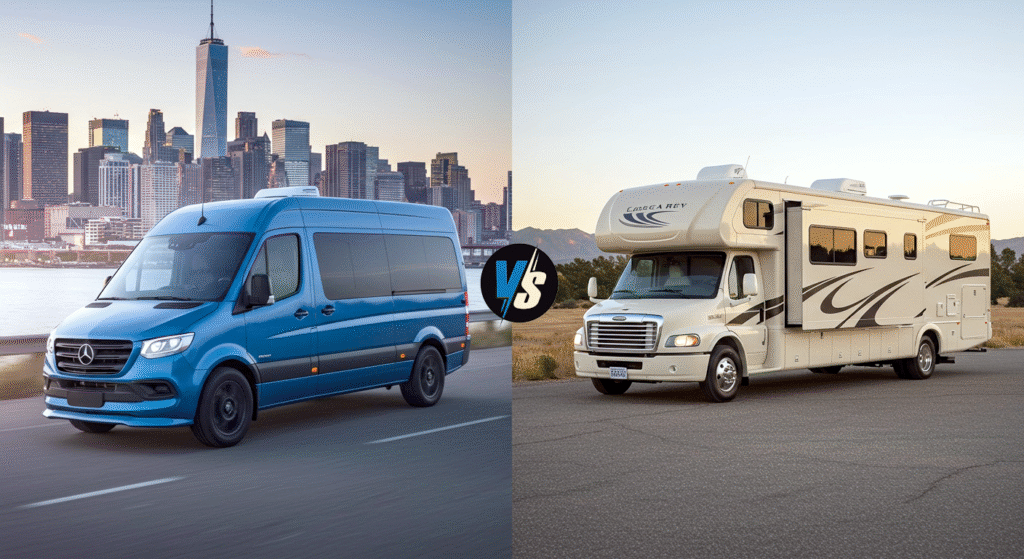Why So Many People Are Trading Houses for Wheels
Over the last decade, a quiet revolution has rolled across highways and backroads: more and more people are leaving behind traditional housing for a life on wheels. Whether it’s retirees chasing endless summers in a 40-foot motorhome, or twenty-somethings working remotely from a sprinter van by a mountain lake, RV life and van life are booming.
But despite the Instagram posts of cozy vans under starry skies, the road lifestyle isn’t all sunsets and coffee mugs perched on dashboards. Parking logistics, cost surprises, and the reality of tiny living quickly come into play.
So, how do you know if this lifestyle is for you? And what’s the real difference between RVs and vans? This guide breaks it all down—pros and cons, how to start, common mistakes to avoid, and insider tips to make your transition easier. Whether you’re curious, ready to dive in, or somewhere in between, you’ll find the knowledge here to take the next step, confidently.
What’s the Difference Between RV Life and Van Life?
Before you weigh pros and cons, let’s clear up definitions.
- RV Life (Recreational Vehicle Life):
Includes motorhomes, travel trailers, fifth wheels, and campervans. RVs are designed for extended travel or full-time living, often with features like kitchens, bathrooms, and slide-outs. - Van Life:
Usually DIY or converted cargo vans (Sprinter, Ford Transit, or Ram Promaster). Vans are smaller, more discreet, and appeal to those wanting agility, minimalism, and off-grid capability.
Think of RV life as a rolling condo and van life as a rolling studio apartment.
What Are the Pros of RV Life?
1. Comfort and Amenities
RVs are built for convenience—beds, bathrooms, kitchens, and storage space already included. Luxury models even come with washer-dryers, big-screen TVs, and recliners.
2. Family and Pet Friendly
RVs are ideal if you’re traveling with kids or pets. Everyone has their own space, and you can bring more of the “stuff of home.”
3. Variety of Choices
From under-$20k travel trailers to $250k luxury Class A rigs, there’s a wide range to fit lifestyles and budgets.
4. Community & RV Parks
Dedicated RV parks offer hookups (water, electricity, sewer), Wi-Fi, and social events—making it easier to connect with a like-minded road community.
What Are the Cons of RV Life?
1. Cost Can Sneak Up on You
Fuel for large rigs, campground fees, insurance, and maintenance add up. Breakdown repairs can easily run into thousands.
2. Less Stealthy
RVs can’t exactly blend into a city street. Wild parking is harder, and you’ll depend on campgrounds or RV-friendly lots.
3. Driving Stress
Big RV = big stress when maneuvering through cities, gas stations, or mountain passes.
4. Maintenance and Storage
More appliances and moving parts mean more potential repairs. When not on the road, finding storage space for an RV is another challenge.
What Are the Pros of Van Life?
1. Mobility and Stealth
Vans can park anywhere a normal vehicle can. Ideal for exploring cities, parking overnight in stealth, or heading off-grid to camp under the stars.
2. Minimalism
You’re forced to simplify, which many vanlifers find liberating. Everything you own is within arm’s reach.
3. Gas Mileage
Most vans use far less fuel than large RVs, saving money on long trips.
4. DIY and Customization
Van builds can be tailored exactly to your needs—whether you want a cozy bed and basic stove or a high-tech solar-powered setup with Wi-Fi boosters.
What Are the Cons of Van Life?
1. Limited Space
Even the largest vans make you consider every belonging carefully. Showering often means gym memberships or portable outdoor options.
2. Temperature Control
Small space = quick heating and cooling. In freezing winters or scorching summers, climate comfort becomes a serious challenge.
3. DIY Challenges
If you choose to build your van yourself, expect a crash course in carpentry, electrical wiring, and plumbing.
4. Not Always Cheaper
A well-built conversion van can be as pricey as an RV (sometimes more), particularly if you want quality materials and off-grid tech.
RV Life vs. Van Life: Quick Comparison Table
| Feature | RV Life | Van Life |
|---|---|---|
| Space | Spacious, full amenities | Minimal, compact living |
| Maneuverability | Difficult in cities | Easy to stealth park |
| Cost | Higher maintenance/fuel | Lower daily costs |
| Customization | Factory layout options | Fully customizable |
| Community | RV parks and resorts | Solo, dispersed lifestyle |
| Ideal For | Families, retirees | Solo travelers, couples |
How Do You Decide Which Lifestyle is Right for You?
Ask yourself:
- Do I want space or freedom? If you crave comfort and elbow room, an RV wins. If you crave mobility and city stealth, go van.
- Am I solo, couple, or family? RVs suit multiple people. Vans shine for singles or minimalist couples.
- What’s my budget tolerance? Vans can be cheaper… but only if you keep it simple. RVs carry more predictable resale value.
- Do I prefer community or solitude? RV parks = built-in social circle. Vans = stealthy independence.
How Do You Start RV or Van Life Without Being Overwhelmed?
Think of it as three steps: Research, Budgeting, Trial Runs.
Step 1: Research and Choose a Vehicle
- RV types: Class A (big, bus-style), Class B (campervans), Class C (cab-over bunk), travel trailers.
- Vans: Sprinter, Ford Transit, Ram Promaster—research reliability, size, off-road needs.
Step 2: Create a Realistic Budget
Account for:
- Vehicle purchase or conversion
- Insurance & registration
- Fuel
- Maintenance
- Campground or parking fees
- Internet solutions (mobile hotspot, Starlink, cell boosters)
Pro Tip: Build a “surprise repairs” fund of at least $2–5k. Something always comes up.
Step 3: Trial Runs Before Full Commitment
Rent an RV for a couple of weeks. Borrow a van from a rental service. Test comfort levels, driving preferences, and whether you enjoy tiny living.
What Mistakes Do Beginners Make in RV or Van Life?
- Overbuying at the Start — Many people start with a huge RV only to realize they hate maneuvering it. Start small.
- Ignoring Weight Limits — Overloading vehicles with belongings strains engines and causes safety issues.
- Underestimating Climate Challenges — Insulation, heaters, and fans are non-negotiable.
- Romanticizing Without Preparing — Life on wheels is rewarding but not effortless. Expect breakdowns, adaptation, and logistical headaches.
How Do You Stay Connected While Living on the Road?
- Mobile hotspots (Verizon, AT&T, T-Mobile)
- Cell boosters for weak signal areas
- Satellite internet (Starlink is a game-changer for remote work)
Showers, Toilets, and Daily Living: What’s the Reality?
- RVs: Usually have built-in bathrooms and holding tanks. Easy, but requires dump stations.
- Vans: Portable camping toilets, gym memberships, truck stop showers, or campground facilities.
- Laundry: Laundromats, campground services, or mini portable washers.
How Do You Find Safe Parking or Campsites?
- Apps: iOverlander, Campendium, Harvest Hosts (farm stays), The Dyrt.
- RV Life: Book RV parks or campgrounds.
- Van Life: Blend into urban parking, rely on dispersed camping on BLM or National Forest lands.
Costs: Is RV or Van Life Cheaper Than Regular Living?
- RVs: $1,500–$3,500/month (including payments, fuel, insurance, parks).
- Vans: $800–$2,000/month depending on stealth parking versus camping fees and build cost.
Reality Check: Neither is automatically cheaper than traditional housing. Savings depend on your lifestyle choices—boondocking vs. upscale resorts makes all the difference.
FAQs:
1. Is van life safe?
Yes, if you practice common-sense precautions: lock doors, choose safe parking, trust your instincts, and use apps to research areas.
2. Can you live in an RV or van year-round?
Absolutely. Thousands of people are full-timers, but climate planning is key. Proper insulation, heating, and cooling systems matter.
3. What’s the best RV or van for beginners?
Start smaller: A Class C RV for families, or a converted Ford Transit for solo/couples. Avoid 40-foot rigs or complex custom vans until you gain experience.
4. How much money do you need to start?
- Entry-level RVs: $15,000–$40,000 used.
- Converted vans: $20,000–$80,000 depending on DIY vs. professional conversion.
Add living expenses and a repair fund.
5. Do you need special licenses to drive an RV?
In most states, no special license is needed unless your rig exceeds 26,000 pounds. Always check state requirements.
Final Thoughts: Hitting the Road with Eyes Wide Open
The dream of RV life or van life is real—but so are the challenges. This lifestyle can give you freedom, flexibility, and experiences no traditional house can offer. But to truly thrive, you need to budget wisely, prepare for the learning curve, and choose the right vehicle for your goals.
Whether you’re aiming for family adventures in a spacious RV, or solo road trips in a stealthy van, hitting the road doesn’t have to be overwhelming. Start small, test the waters, and embrace the reality along with the dream.
After all, the best road trips aren’t defined by miles or vehicle size—they’re defined by how you grow along the way. So pack your essentials, set your sights on the horizon, and roll forward with both curiosity and confidence.

